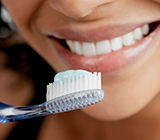1) Active Ingredients
The biggest difference among teeth whitening products is their active ingredient. There are two basic types of products that each use different key ingredients:
Whitening toothpastes that remove surface stains.
Surface stain removers whiten teeth by using abrasive ingredients that essentially polish the teeth. They don't actually alter the colour of your teeth, but they can remove some of the discolouration. Keep in mind that while there are no bleaching agents included, using surface stain whitening toothpastes over time may cause tooth sensitivity as the abrasive ingredients can still wear down your tooth enamel.
Bleaching toothpastes and whitening gels.
For an even brighter smile, look for a whitening toothpaste that contains a bleaching agent such as peroxide. You'll typically get faster results with a product that bleaches teeth rather than simply removing surface stains. Continued use of toothpastes that contain a bleaching agent can cause sensitive teeth – so keep this in mind if you start to experience tooth pain.
Some of the active ingredients you should look out for when choosing a whitening toothpaste include fluoride, sodium lauryl sulfate (SLS), hydrogen peroxide and carbamide peroxide. The higher the concentration of hydrogen peroxide means the more effective the toothpaste will be at whitening, however, it also means there’s more chance of experiencing irritation or sensitive tooth pain with continued use.
2) Enamel Protection
Once your teeth are white, using a toothpaste that fortifies and protects enamel can help teeth stay bright. By strengthening weaker spots in your teeth, enamel-protection toothpaste makes it harder for stains to penetrate and yellow your teeth. It's an ideal maintenance product to help your teeth stay white and bright. In between whitening, choose a toothpaste designed to help strengthen and protect enamel – this can also help if you often experience sensitive teeth when using whitening toothpastes or during a whitening treatment.
3) Fluoride
A great toothpaste for whitening teeth will always contain fluoride. Fluoride is a naturally occurring mineral and is used in dentistry to strengthen tooth enamel. Some of the benefits of using a fluoride toothpaste include:
It rebuilds and remineralises weakened tooth enamel
It slows down the loss of minerals from tooth enamel
It reverses the early signs of tooth decay
It prevents the growth of harmful oral bacteria
Some people choose to use a fluoride-free toothpaste, however, these formulas don’t offer any cavity protection for your teeth, meaning you’re more at risk of developing tooth decay.
4. Gum Protection
As well as enamel protection, if your toothpaste offers gum protection this is another good sign. Gum protecting toothpastes are good if you suffer from sensitive teeth, which can be a side effect of using a whitening toothpaste. For example, whitening toothpastes that contain potassium nitrate both remove surface stains and help prevent sensitivity.
5. Non-Abrasive Formulas
The best toothpaste for stained teeth is one that is formulated to remove surface stains. However, these toothpastes tend to be more abrasive on tooth enamel than non-whitening toothpastes, as the abrasive ingredients are good at polishing your enamel and making it shine again. If you’re concerned about your enamel, there are non-abrasive formulas available that are more gentle on your teeth and, with continued use, will still leave you with a brighter smile. For example, the formula used in Colgate Max White Ultra Active Foam Toothpaste provides zero-abrasive whitening of deep stains on teeth caused by food and drink, and is enamel safe for daily use.
Other Benefits
Because you don't have time to use several products every time you brush, the best whitening toothpaste also comes with other benefits, such as cavity protection and breath freshener, and can help improve gum health. Make sure that the whitening toothpaste you choose has fluoride to prevent cavities, along with a mild abrasive, such as sodium lauryl sulphate, to help keep teeth clean and stain-free.
Bupa suggests consulting with a dentist before you start using a whitening product, as recommended treatment depends on your individual circumstances. For example, crowns and fillings can affect the way whitening agents work, so you'll need to check with your dentist concerning the best active ingredients and process by which you can score a whiter smile.
Whitening with Sensitive Teeth
It's true that the most common side effect for bleaching ingredients can be some mild tooth sensitivity. If you are suffering from sore teeth and gums after switching to a whitening toothpaste, you might need one with milder active ingredients. Try switching to a surface stain remover instead of a bleaching toothpaste, or look for a whitening toothpaste formulated for sensitive teeth to help get the benefits of whitening toothpaste without any discomfort. You could also switch between using a whitening toothpaste and a toothpaste made for sensitive teeth to get the best of both worlds.
Other Teeth Whitening Methods
Even if you’re using the best toothpaste for whitening teeth, you may not be able to get the results you want. In that case, you can always visit your dentist for a professional whitening treatment – these treatments are safe when carried out by a professional and will get you great results! You might also opt for an at-home whitening treatment and try out some other products along with your whitening toothpaste.
Professional Whitening Treatment
Your dentist will be able to let you know the teeth whitening treatments they offer in-chair. The most common option is professional bleaching using a custom mouthguard you’ll wear over your teeth. Your dentist will apply the bleaching agent to the mouthguard which you’ll then wear for around an hour – you can repeat this process until you achieve the level of whiteness you desire! Alternatively, you may choose to get laser whitening. This whitening treatment is quick and offers great results as the laser can boost the active ingredients in the bleaching solution, but it’s usually the most expensive option. Both of these options use a much stronger bleaching solution than you’ll ever find in a whitening toothpaste, so you can expect great results, however, if your teeth are prone to sensitivity, you may experience some discomfort or irritation following your treatment.
At-home Whitening Treatment
If you’d prefer to whiten your teeth at home, there are plenty of options available to you. You can get an at-home bleaching kit from your dentist, or you might choose one of our Colgate whitening solutions like our LED Whitening Kit or our Overnight Whitening Pen. We have many products available that will give you great results and leave your smile sparkling! When you’re whitening your teeth at home with products like these, always follow the instructions on the packaging – don’t leave the product on your teeth for longer than advised and only use it as often as is recommended. If you feel any pain or discomfort during your at-home whitening treatment, stop using the product immediately and use a toothpaste for sensitive teeth for a few days after.
Is Whitening Toothpaste Safe?
Whitening toothpaste is safe to use, however, overusing any whitening products can lead to sensitive teeth and gum irritation. This is something to keep in mind – if your teeth are uncomfortable or sensitive after brushing with these products, take that as a sign to stop using them less often or stop using them altogether. Also, look for toothpastes that contain ingredients to protect tooth enamel along with whitening – look for ingredients like sodium fluoride, stannous fluoride or calcium phosphate. Most types of over-the-counter whitening toothpaste are safe to use twice a day when you brush for 2 minutes, but always make sure you follow the instructions on the packaging.
3 Whitening Toothpastes Recommended by Colgate
When you buy a whitening toothpaste, always make sure it comes form a reputable brand. We offer a wide range of Colgate whitening toothpaste, but here are three of our favourites:
Max White Ultimate Radiance Toothpaste
Colgate Max White Ultimate Radiance Toothpaste is our most advanced whitening toothpaste yet – it can reverse 15 years of deep-set stains* and instantly* whitens your smile! This enamel safe toothpaste uses whitening science, powered by dual colour-correct action, to whiten both the surfaces of your teeth and below the tooth enamel. Optic brighteners reflect blue light to give you instantly* whiter looking teeth, while the formula gets to work below your enamel surfaces to detect and remove deep-set stains*, for a dazzling smile!
Max White Ultra Active Foam Toothpaste
Colgate Max White Ultra Active Foam Toothpaste gives whitening results in just 3 days**! A regular whitening toothpaste will lift surface stains, but Max White Ultra Active Foam uses deep oxygenated action to safely penetrate your tooth enamel to lift the deeper stains that are caused by food and drink. The non-abrasive formula means it’s gentle on your tooth enamel and safe to use twice a day, every day. It also prevents future stains and keeps your smile radiant!
Total Advanced Whitening Toothpaste
Colgate Total Advanced Whitening Toothpaste offers superior surface stain removal*** when compared with fluoride non-whitening toothpaste. It provides 24 hour bacterial defence for your whole mouth***, fights plaque bacteria 3x more effectively than regular fluoride toothpastes*** and offers additional benefits like protecting your gums and tooth enamel and giving you fresh breath.
How Long Does It Take to Whiten Teeth with Whitening Toothpaste?
People often wonder how quickly they’ll see results once they start using whitening toothpaste regularly. This really depends on the whitening toothpaste you choose and the active ingredients it contains. For example, some Colgate whitening toothpaste can lift surface stains within three days, or use dual colour-correct action to give an immediate whitening effect. However, in general a whitening toothpaste takes around two to six week to make teeth appear whiter. The whitening effects of toothpaste will usually be subtle and won’t give dramatic results like getting a professional whitening treatment from your dentist.
Keep in mind that what you eat and drink can have a big effect on the shade of your teeth. So, even if you’re using the best toothpaste for whitening twice a day, if you drink a lot of tea or coffee, or eat dark fruits or curries often, you may not notice the same difference as someone who avoids these foods.
Teeth whitening isn’t permanent, results will vary and you’ll need to keep on top of treatments or continuously use whitening toothpaste to lift surface stains. Teeth will discolour over time because of the things you eat and drink, lifestyle choices like smoking or through the natural ageing process.
Whitening toothpaste is safe for your entire family, but it never hurts to talk to your dentist about options for whiter smiles. By looking at the list of ingredients and researching the benefits, you can find the best toothpaste for whitening or approved whitening treatment for you. Always practice a thorough oral care routine and visit your dentist regularly for checkups and professional cleaning – this is the best way to keep your smile bright and healthy!
*Instant effect is temporary. Stains caused by food and drink with 4 weeks of continued use.
**Stains caused by food and drink vs fluoride toothpaste.
***Vs fluoride non-whitening toothpaste.
***Superior bacterial reduction on teeth, tongue, cheeks and gums vs. non-antibacterial fluoride toothpaste with 2X daily continued use after 4 weeks.
***Vs fluoride toothpaste (1450ppm), continued use after 3 months.
ORAL HEALTH QUIZ
What's behind your smile?
Take our Oral Health assessment to get the most from your oral care routine
ORAL HEALTH QUIZ
What's behind your smile?
Take our Oral Health assessment to get the most from your oral care routine













